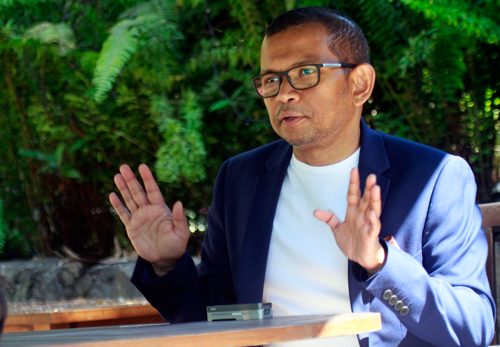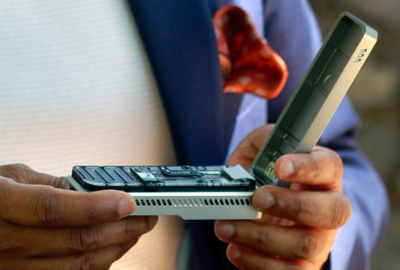Top Nanopore expert is Sri Lankan

Dr Lakmal Jayasinghe: Meteoric rise since undergraduate days. Pix by Indika Handuwala
Seated in the lobby of a Colombo hotel on Thursday morning, having a long and leisurely chat, on the low table is a laptop, a spectacle case and a small grey-silver rectangular box.
Not much notice have I given the box, assuming that it is a personal item when Dr. Lakmal Jayasinghe pulled it out of his pocket. After a while, he flicks open the cover and embedded in the box is what looks to ignorant me like a stapler!
No, it is not – it’s the pocket-size sequencer, MinION, the only portable real-time device for DNA (deoxyribonucleic acid) and RNA (ribonucleic acid) sequencing, not only crucial in these pandemic times but all other times as well to detect bugs that cause disease, among other things.
This device which can be taken anywhere – to the field, a house, a hospital or kept in a laboratory – is part of the valuable technology that allowed Sri Lanka to get a heads-up about a Madiwela COVID-19 positive person being infected by the Delta ‘variant of concern’ way back in June last year.
And it was Dr. Jayasinghe, Vice President of Research and Development in Biological Sciences at Oxford Nanopore Technologies, who donated this nanopore sequencing platform and reagents required to sequence an initial 384 COVID-19 samples in Sri Lanka.

The pocket-size sequencer
The donation was to the only laboratory in the country that was performing sequencing at that time – Prof. Neelika Malavige’s Department of Immunology and Molecular Medicine, University of Sri Jayewardenepura.
These are the devices that NASA (the National Aeronautics and Space Administration of America) has not only taken to space but also to its deep sea lab. (See box)
Interesting is the tale of how Dr. Jayasinghe – who celebrates his 50th birthday in January – has reached this top niche where few hold sway.
Middle class was his home in Katubedda, Moratuwa, just like for thousands of children in the country, with a father who was a public servant and a mother who was a housewife. He was the third of four siblings, two older sisters and a younger brother.
Lakmal was the only one into science, with a deep yearning to become a doctor from the time he was a child, attending President’s College, Rajagiriya, up to Grade 5 and gaining entry to prestigious Ananda College, Colombo, through the Scholarship Examination. He sat the Advanced Level (AL) thrice to follow his dream of becoming a doctor but settled for a bioscience degree at the Faculty of Science, University of Colombo, when he could not secure the competitively high marks required to enter the Medical Faculty.
In his second year, when he had to choose whether he wished to continue a General Degree or do a Special Degree, he was “not too sure”. Having scored very high marks at the end of the second year, he had a choice – he was among the 20 top students who could do a Chemistry Special Degree; 8 top students who could do a Zoology Special Degree; and 6 top students who could do a Botany Special Degree.
Wavering was Lakmal. A General Degree would only take three years, while a Special Degree would take four, also much harder study. He was also adept in computer technology and had won several world prizes as part of the Australian Computer Society.
Two of his gurus, however, had no hesitation.Chemistry should be your field, insisted Prof. Sujatha Hewage, assuring Lakmal that “one day he would do really well”. The other was Dr. Ramani Gunasekera.
“I am here today because of them, for a good teacher knows the strengths and weaknesses of her students,” says Lakmal, adding that another life-changing influence was exuded by his supervisor Dr. Maya Gunasekera (pioneer in DNA fingerprinting) who inspired him to follow the line of biochemistry molecular biology. (Incidentally, DNA fingerprinting from the crime scene carried out by Dr. Gunasekera was used in court for the first time in the Hokandara murder case, where all accused were convicted.)
There has been no turning back for Lakmal since his undergraduate days, only a climb up the ladder. Armed with a B.Sc (Honours) degree in Chemistry, he joined the university as an Assistant Lecturer, before seeking a post-graduate qualification and so he applied to several universities in America. One of them was Texas A&M University, among the top 10, where eminent Prof. Hagan Bayley had his much-sought-after laboratories of biochemistry and genetics.
To Prof. Bayley’s query: “Why should I choose you”, Lakmal’s humble reply had been that he should check out the recommendations sent by his professors from Sri Lanka which he (Lakmal) had not seen. Shortly thereafter, Prof. Bayley had informed him: “You are selected.”
More crossroads in Lakmal’s life were yet to come. Two years into his doctoral studies, Prof. Bayley had been offered a high-level post in the field of Chemical Biology at the University of Oxford, United Kingdom (UK), and once again sent Lakmal’s world into a spin with a request that he accompany him.
Finally, Lakmal did move with him to Oxford and into a “different world” in 2003 on scholarship to continue his research in molecular biology and protein engineering.
It was starting from scratch, for facing them were absolutely empty labs, with Prof. Bayley placing his full confidence and trust in Lakmal to do the needful……….“the fancy buildings were a blank canvas”.
So, fell on the able shoulders of Lakmal, the onerous responsibility of setting up all the biochemistry molecular biology labs, while training as a graduate student of the esteemed University of Oxford.
On the day of the opening, he met Queen Elizabeth II who graced the grand occasion, smiles Lakmal.
In May 2005, seeing a need to commercialize nanopore technology, which no one believed was achievable, Prof. Bayley (Lakmal’s PhD supervisor) and Chief Executive Officer Dr. Gordon Sanghera had co-founded Oxford Nanopore Technologies, a private company, with Chief Strategy Officer Dr. Spike Willcocks on the team. It was a spin out company of the University of Oxford.
Having gained his PhD in Chemical Biology in 2006, Lakmal, employee No. 7, was the first ‘wet chemistry scientist’ to join Oxford Nanopore Technologies. He explains to the uninitiated including me that a‘wet lab’ is where all types of biological matter can be analyzed and tested using various liquids, as opposed to a ‘dry lab’ which focuses on applied or computational mathematical analyses through computer-generated models or simulations.
In the past 15 years, Lakmal has led the nanopore research and development teams as a senior scientist, principal scientist, director and senior director before being promoted as Vice President. With the support of a best-in-class R&D team and also a broad intellectual property portfolio, he has made a significant contribution towards inventing and developing nanopore sequencing and converting just a concept to a world dominating and game-changing product.
Now, Oxford Nanopore Technologies, headquartered in Oxford, has 800 employees spread across many countries including the Far East.
Just two months before last year (2021) came to a close, the company had an initial public offering (IPO) or stock launch where its shares were on offer.
It was one of the most successful biotechnology IPOs on the London Stock Exchange, says Lakmal.
In his personal life, Lakmal not only loves to cook but is also a graceful ballroom and energetic latin dancer who has won gold-level kudos. Though he has not been dancing recently due to all his responsibilities, he says this is a hobby which relaxes him.
Some of the challenges he has faced, meanwhile, when securing his PhD (doctorate) in a tough and competitive field such as chemistry is that though there was theoretical knowledge to pass his AL and undergraduate hurdles, the research experience fell short. Among the “top of the top” at Oxford, he also needed to garner confidence that he could fit in…….that he was no different to the others.
In his work life, Lakmal has gained respect for being grounded, level-headed and neutral. Not too bossy and can get things done without too much noise, is how the CEO had described Lakmal. He had indicated that while Prof. Bayley was the “best” in the world of nanopore scientists, Lakmal was one of the very few key people at the heart of this technology.
A bachelor because “science is my spouse”, Lakmal says that if ever he leaves behind his passion for nanopore technology, he would like to open a restaurant. If it is in Sri Lanka, he would offer western cuisine and if in England,
Sri Lankan cuisine.
| To space and deep sea | |
| Nanopore technology has gone to space and the deep sea with NASA. This is to see to the health of the astronauts, says Lakmal, explaining that a simple saliva sample would help get an early indicator through this technology which pathogen (bacterium or virus) is causing trouble. Otherwise, they would have to depend on doctors who are on faraway earth to make the diagnosis without a basic scientific clue. He adds that Oxford Nanopore Technologies is working closely with NASA on moon and Mars explorations and NASA’s space station is armed with this technology in case there are any indications of extraterrestrial life. |
Searching for an ideal partner? Find your soul mate on Hitad.lk, Sri Lanka's favourite marriage proposals page. With Hitad.lk matrimonial advertisements you have access to thousands of ads from potential suitors who are looking for someone just like you.


